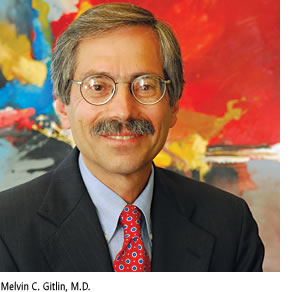 |
 |
 For many people, the words Hurricane Katrina still conjure up reflections of horrific pictures seen on television of the deadliest storm to strike the United States in more than 75 years. For Melvin C. Gitlin, M.D., and others who were in New Orleans at the time, the words are reminders of survival, character, and perseverance. For many people, the words Hurricane Katrina still conjure up reflections of horrific pictures seen on television of the deadliest storm to strike the United States in more than 75 years. For Melvin C. Gitlin, M.D., and others who were in New Orleans at the time, the words are reminders of survival, character, and perseverance.
Gitlin, who joined the UM Miller School last summer as professor and vice chairman in the Department of Anesthesiology, Perioperative Medicine, and Pain Management, shies away from praise—but his non-stop efforts to ensure the survival of the anesthesiology residency program at Tulane University School of Medicine, where he worked for 16 years, were an example of sheer dedication to his residents and their education. Gitlin, who is also an internationally known expert in pain management, shared his post-hurricane experience in the article “Coping with Disaster: Relocating a Residency Program,” in the August issue of Academic Medicine, the journal of the Association of American Medical Colleges.
The co-authored article details the difficult decisions made when the Tulane program, along with the majority of residents, moved many miles away to the Baylor College of Medicine in Houston. Taking a cue from some corporations’ actions post-9/11, Gitlin sought counseling for some residents and helped others transfer to programs close to where they had family members, including one to UM/Jackson.
Since the hurricane, Gitlin has lectured on the topic and considers the article a “blueprint” to which academic institutions can refer in the event of a major disaster. As chairman of anesthesiology, when the residency program director left after the hurricane Gitlin had to take charge.
Says Gitlin: “As an educator there is a short-term problem that there is a group of doctors for whom you have the responsibility to teach and to lead. At the same time, what do you do about the long-term responsibility you have to provide first-rate education and specialty training down the road? Do you have to make radical change for the short term or do you sacrifice the long term for near-term expediency? That’s something that is very difficult, but I had to work it out.” |
 |
 |


